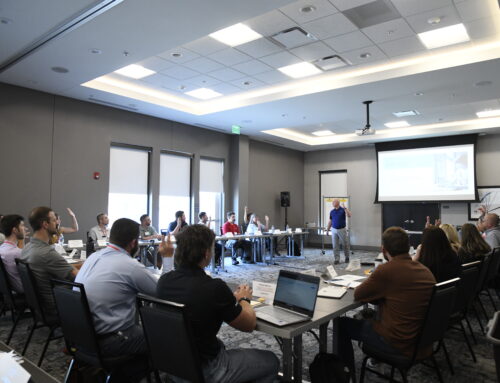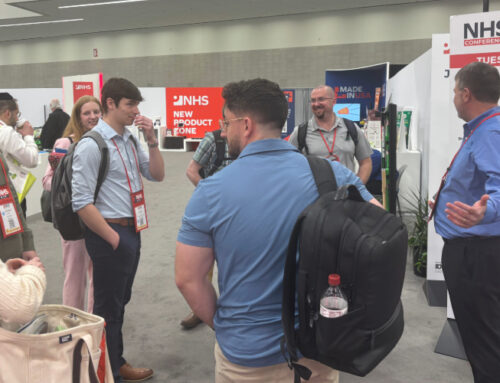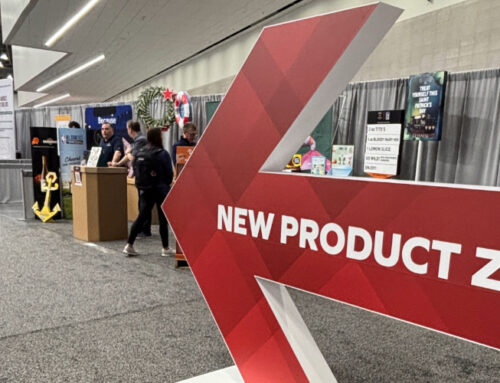In an era where labor costs are on the rise and the search for the right talent becomes increasingly challenging, retail businesses are compelled to rethink their approach to workforce management. The U.S. Chamber of Commerce America Works Data Center reports that the labor shortage gap is decreasing, but there are still more jobs available than people to fill them. At the end of 2024, there were 8 million job openings in the U.S. but only 6.8 million unemployed workers.
At the 2024 Independent Home Improvement Conference, hosted by the North American Hardware and
Paint Association (NHPA) and The Hardware Conference, three retailers—Yilda Marte, Leonardo Osorio and
Gina Schaefer—shared the unconventional methods they have employed to effectively source and manage talent to put—and keep—the right people in the right positions in their operations. Tap into their best practices as you fill open roles in your own operation.
An Opportunity to Work
With 16 locations and over 525 employees, the biggest challenge facing Sunpro is the limited labor pool in manufacturing seen since the COVID-19 pandemic, says Osorio, who is the director of human resources for Sunpro.
Osorio heads up an innovative initiative that has brought much-needed labor to Sunpro. Sunpro is part of the U.S. Citizenship and Immigration Services’ H-2B Visa Program, which allows U.S. employers who meet specific regulatory requirements to bring foreign nationals to the U.S. to fill temporary nonagricultural jobs. As part of the H-2B Visa Program, Sunpro brought 45 people from El Salvador to work in 2022, 42 people in 2023 and
39 in 2024.
To qualify as an H-2B Visa petitioner, an employer must demonstrate there are not enough U.S. workers who are able, willing, qualified or available; show that employing H-2B workers will not adversely affect the wages and working conditions of similarly employed U.S. workers; and show the work is temporary, from a one-time occurrence to seasonal work for 10 months out of the year or less.
“If you’re interested in the program, two things you must consider: be sure to apply on time and be sure to show it’s a temporary need,” Osorio says. “It’s also crucial to be specific in what type of employee you need. For example, if you need somebody who speaks English, it needs to be in the job description submitted to the government by the deadline each year.”
Osorio says other key pieces for success are hiring a knowledgeable attorney to stay on top of the many compliance components that come along with the program and offering onboarding that sets the H-2B employees up for success. The employer covers the cost of the airfare to come to the U.S. and the visa, and the applicant is responsible for housing, transportation and other costs. To help the new employees get acclimated, a Sunpro representative greets each one at the airport when they arrive.
“Even if they arrive at 3 a.m., we have a Sunpro representative at the airport greeting them and sharing information about what they’re going to need during their time with us,” Osorio says. “We provide a number of community resources, including 75% tuition reimbursement for them to go to a local school or community college to take classes to learn English, lists of their religious organizations that are in town, a directory of the grocery stores and a list of any type of activities that they want to do.”
While bringing in employees from El Salvador has benefited Sunpro, being able to help those employees and their families has been the biggest positive, Osorio says.
“This is helping them, it’s helping their families,” he says. “We have had people who this is the third year they have come, so it can be very successful.”
Becoming Professionals
Schaefer, founder of A Few Cool Hardware Stores, a 13-store chain in Washington D.C., Baltimore, Maryland, and their surrounding areas, says the rhetoric of the unemployment problem points to the record low employment rates the U.S. has been experiencing as a success, but many employers are still saying they can’t find good employees.
“We need to look differently at different folks, because the people who can get a job generally are finding a job,” Schaefer says. “We’re all looking in the same place for the same people, and we need to be looking beyond the same labor pools.”
Since opening her first store in 2003, Schaefer has focused on providing chances and offering opportunities to those who need them most. Her book, “Recovery Hardware,” shares Schaefer’s path to building an innovative business that revitalized her urban community and provided opportunities for everyone to thrive, no matter their past.
“I think we’ve gotten away from thinking of retail as a profession. We say things like, ‘I’m just a retailer, I just sell hardware,’” Schaefer says. “I am a big believer in hiring from nontraditional backgrounds. I hire lots of folks coming home from prison and those in recovery. Those populations have helped build
my business into an amazing company, and I think it’s because we treat everybody who comes to the door like they have the ability to be a professional.”
When it comes to employee retention, Schaefer found that creating an employee stock ownership plan (ESOP) was the perfect succession plan for a company built on a culture of engagement. Schaefer and her team have been emphasizing that the ESOP may not change an employee’s twice-a-month paycheck, but it is impacting the trajectory of their retirement. When employees buy into the success of the company, they are directly impacting their own financial success.
“Adding the ESOP was one extra lever of sharing in the wealth and building of the company,” Schaefer says. “We are constantly educating a new owner on what it means to be a new owner, and then hoping they stay because now they feel that ownership piece.”
That culture of engagement also includes taking care of the employee.
“We still have to make sure we’re handling all of the wellness along the way,” Schaefer says. “If somebody does choose to work with us their whole career, particularly as a sales associate, we want to make sure they can afford to live where our stores are and get to that retirement piece where they really are seeing the benefits.”
A Solid Start
At Sunshine Ace Hardware, which has 14 locations in Florida, the focus has been on labor optimization and bringing in those tools that provide productivity and efficiency. Marte, director of human resources, says employees are trying to do more with less, and so Sunshine Ace is committed to providing robust onboarding and training to set up employees for success.
“When we looked at our turnover, we saw we needed to focus on those first six months, specifically those first 90 days,” Marte says.
Success in employee retention starts with welcoming the new hire, and so Sunshine Ace Hardware has implemented an employee engagement team, which champions each new hire, starting with their first day on the job by providing a personalized gift. The leadership team also shares with the entire staff when a new person is hired so each employee can welcome that new employee as well.
Marte and her team ensure each new employee is partnered with the right subject matter expert (SME) for each department and that training from each SME is consistent from store to store so employees feel comfortable if they work at multiple locations.
New employee orientation takes place within the first two weeks of a new employee starting and consists of a full day that covers core values, culture and company history, as well as expectations and communication training through DiSC. Marte has implemented 30-day, 60-day and 90-day training plans, which assures the employee is receiving the information and training they need to be successful beyond orientation. After the first 90 days, the new employee works one-on-one with their manager who creates a development program tailored to that employee.
Beyond taking care of the employees during training, Marte says the company focuses on overall wellness—physical, mental and financial. Sunshine Ace Hardware offers an employee assistance program (EAP) and partners with several community organizations to offer perks to employees.
One example is the company’s partnership with a local bank to offer financial literacy covering wealth, investing, creating a budget, credit scores, owning a home and more so that employees can stretch their wages. Sunshine Ace Hardware also works with the National Mental Health Association to put all managers through mental health first aid training, offers an employee loan program and after Hurricane Irma, the owners put together a grant program employees can apply for to cover various financial emergencies.
“Our approach is to look at the employee as a whole,” Marte says. “We want to be a sanctuary for our employees.”
Qualifiying for the H-2B Visa Program
-
Demonstrate there are not enough U.S. workers who are able, willing, qualified or available
-
Show that employing H-2B workers will not adversely affect the wages and working conditions of similarly employed U.S. workers
-
Show the work is temporary, from a one-time occurrence to seasonal work for 10 months out of the year or less
It’s crucial to be specific in what type of employee you need. If you need somebody who speaks English, it needs to be in the job description submitted to the government by the deadline each year.
—Leonardo Osorio, Sunpro
Learn more at uscis.gov.
Reframe Your Hiring: Advice From the Unconventional Recruitment and Hiring Corner
By Gina Schaefer
Years ago, I hired a new teammate with really impressive skills.
They were great with money, as in good old-fashioned cold hard cash. They were a pro at counting it, collecting it and using it to buy new inventory. Sounds perfect for someone in a retail role, doesn’t it?
Second, they were used to working odd and unusual hours—happy to have a place to go and willing to work as many hours as possible.
And third, they were fantastic with people. In fact, sometimes the more difficult the customer, the more my teammate shined. They taught me more about customer service and about how to deal with excessively demanding shoppers or employees than any business book I’ve read.
They started as a sales associate at Logan Hardware and eventually moved into a management role.
I shared this story from the stage once and asked the audience who they thought I had hired, and a voice in the back of the room yelled “a mom!” She was thinking of someone who is resourceful, responsible and up all night dealing with crying babies.
Not a bad guess, but I had hired a former drug dealer. Yep.
I have gotten a lot of mileage talking about this teammate over the years. Who in their right mind hires a former drug dealer to “mind the store”? Everyone loves the idea of his skillset and wants to steal him from me—until they hear his resume.
But that’s when I explain that the skills that made him so successful in his prior career also made him great in retail.
I realized early on that if we could reframe how we judge skill sets and think about our employee base in a much broader way, we can grow our team in ways we never thought possible.
He worked with us for 11 years and made our business a lot of money.
You don’t have to be a professional to work in our business, but you have to BE professional. Over the years when I’ve wished for “an adult in the room” to help me noodle through a leadership challenge we’ve hired a business coach. One such event occurred in 2008 when we decided we needed to define and document our core values because we were growing at a pretty fast rate. This engagement ultimately became an exercise in asking our team what we wanted to be when we grew up.
The coach explained to us that documentation was one thing, but living and breathing the values was a completely different story. We wanted them to come to life! We didn’t want to put them in our handbook and on our website and never look at them again. And frankly, I didn’t care if our customers knew what our values were, I wanted us to embody them in everything we do. So, we peppered them into places like our interview questions, our counseling sessions and our awards programs.
The value of doing this came to life almost immediately when I hired a young man named Eddy.
Eddy had grown up in public housing and had never had a job before. He didn’t know what it meant to have a boss, and seemed terrified of me! He arrived for his interview with a mentor from a local nonprofit who ended up doing all the talking because Eddy was too shy to speak.
Eventually, I trotted out the core values. I asked Eddy (er, the mentor) to tell me about a time he was a good neighbor and out of the corner of my eye, I saw Eddy light up! He may have never had a boss before, but he had a neighbor named Mrs. Wilson whose cat he fed and groceries he carried. His candidacy was inked at that moment.
Eddy worked with us for ten years, finding his voice and growing his skills before leaving us to go to college.
Create policies that serve everyone. Over the years we’ve hired dozens of folks who have been overlooked for one reason or another in their lives—perhaps like the two described above. I’ve come to call these teammates my nontraditional teachers because their experiences, often very different from mine, have taught me how to be a better leader. Actually, they’ve taught me how to be a better human being.
Our policies and procedures were written for everyone on the team and have served us well over the years. Beyond the core values we created non-negotiables, rules for tardiness, service level expectations and learning goals.
Every community has an underemployed population. In some places it’s returning citizens, in some it’s immigrants, veterans or moms reentering the workforce. All of our businesses need new teammates every now and then and by broadening our pool of candidates, we can end up with a stronger team to help fuel future success!







